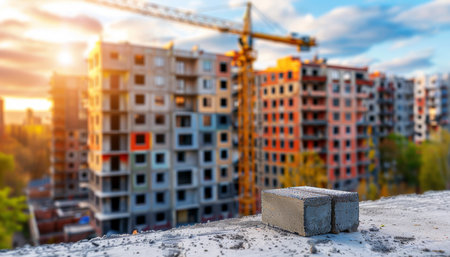Introduction to RERA Act and Its Importance
The Real Estate (Regulation and Development) Act, popularly known as RERA, was introduced in 2016 by the Government of India as a landmark reform in the real estate sector. Prior to the implementation of RERA, homebuyers across India often faced daunting challenges like project delays, lack of transparency, and unfulfilled promises from developers. The inception of RERA was driven by an urgent need to bring more structure, transparency, and accountability to Indias booming but largely unregulated real estate market. By making it mandatory for developers to register their projects under RERA before advertising or selling, the Act aims to protect flat buyers from fraudulent practices and ensure fair transactions. Especially for first-time buyers and families investing their hard-earned savings into a new home, RERA serves as a much-needed legal safeguard. With its strict compliance requirements and focus on consumer rights, the Act has become a game-changer for anyone looking to purchase property in India’s diverse real estate landscape.
2. Key Rights of Flat Buyers under RERA
The Real Estate (Regulation and Development) Act, 2016—popularly known as RERA—has transformed the landscape for flat buyers across India. Understanding your rights is crucial to making an informed investment and safeguarding your hard-earned money. Here, we break down the core protections and legal entitlements every Indian homebuyer enjoys under RERA.
Highlights of Buyer Protections Under RERA
RERA places the buyer at the centre of the transaction, mandating strict compliance from developers. The table below summarises the most vital rights you should be aware of:
| Key Right | Description |
|---|---|
| Right to Information | Buyers can demand all project-related details—approvals, layout plans, timeline, completion status, carpet area, etc.—from developers registered under RERA. |
| Timely Possession | Developers are legally bound to deliver possession by the promised date. Delays attract compensation to buyers as per RERA rules. |
| Advance Payment Regulation | Builders cannot take more than 10% of the cost as advance booking amount before signing a registered agreement for sale. |
| Defect Liability Period | If any structural defect or poor workmanship is found within 5 years of possession, the developer must rectify it at no extra cost within 30 days of notice. |
| Right to Withdrawal & Refund | If the builder fails to deliver on commitments or violates terms, buyers can withdraw and claim a full refund with interest. |
Legal Obligations Developers Must Fulfil
- Every real estate project (over 500 sq.m or more than 8 flats) must be registered with the respective state’s RERA authority before any advertisement or sale.
- The promoter must disclose every material detail—including title deed, encumbrance certificate, and sanctioned plans—ensuring complete transparency for buyers.
- All payments received from buyers for a particular project are to be kept in a separate escrow account; minimum 70% of funds must only be used for that specific project’s construction and land cost.
Empowering the Indian Buyer: RERA’s Impact
With these statutory safeguards, Indian flat buyers today have much stronger legal standing than ever before. From Pune to Bangalore, Mumbai to Chennai, knowing your rights under RERA empowers you to make well-informed decisions and demand accountability from builders—making your homebuying journey smoother and stress-free.

3. Carpet Area and Fair Pricing: What You Need to Know
When purchasing a flat in India, understanding the concept of carpet area is crucial for ensuring you are getting your money’s worth. The Real Estate (Regulation and Development) Act, 2016 (RERA) has brought much-needed clarity by standardising the definition of carpet area across all states and union territories. According to RERA, carpet area refers to “the net usable floor area of an apartment, excluding the area covered by the external walls, areas under services shafts, exclusive balcony or verandah area and exclusive open terrace area, but includes the area covered by the internal partition walls of the apartment.”
Why Does Carpet Area Matter?
Before RERA, builders often quoted prices based on super built-up area, which included common areas like staircases, lifts, lobbies, and even clubhouses. This lack of transparency led to confusion and sometimes overcharging. With RERA’s mandate, pricing must now be strictly based on carpet area. This means you are paying only for what you actually use inside your flat—no hidden costs or ambiguous calculations.
How Does It Impact Your Flat Purchase?
The shift to carpet area-based pricing ensures fairness and transparency. For example, if a developer advertises a flat as 1,000 square feet, under RERA this must refer to the actual usable space within your unit—not just an inflated figure that includes shared amenities. This empowers homebuyers in cities like Mumbai, Bengaluru, or Delhi NCR to compare projects more accurately and make informed decisions.
Checklist for Homebuyers
- Always ask for the carpet area as per RERA guidelines before booking a flat.
- Compare prices of different projects on a carpet area basis for apples-to-apples evaluation.
- If there is any discrepancy between what was promised and what is being delivered, you have legal recourse under RERA.
By understanding these details about carpet area and its impact on pricing, you ensure that your hard-earned investment in a new home is protected—and that you get precisely what you pay for in line with Indian real estate norms.
4. Project Registration and Transparency Norms
Under the RERA Act, one of the most significant reforms for Indian homebuyers is the mandatory registration of all real estate projects with the respective State RERA authorities. Builders and promoters must register their residential or commercial projects if the land exceeds 500 sq. metres or has more than eight apartments. This rule aims to curb malpractices in the property market and ensure transparency for flat buyers across India.
Compulsory Project Registration: What Does It Mean?
The law prohibits builders from advertising, marketing, booking, or selling flats in a project before obtaining a valid RERA registration number. The process requires developers to provide detailed project information—such as sanctioned plans, layout approvals, land titles, carpet area, completion timelines, and previous project history—ensuring accountability at every stage.
How Buyers Can Access Verified Project Information
To empower buyers with accurate and up-to-date information, each State RERA authority has set up an official online portal. Prospective buyers can use these portals to check:
- Project registration status
- Promoter’s details and track record
- Legal approvals and documentation
- Construction progress and completion schedules
- Litigation or complaints (if any) against the project
Key Features Available on RERA Portals Across States
| Feature | Description | User Benefit |
|---|---|---|
| Project Search Tool | Find projects by name, location, or promoter ID | Easily verify if a project is legally registered under RERA |
| Document Repository | Access uploaded sanctions, plans, and certificates | Review crucial legal documents before making payments |
| Status Updates | Track construction progress and milestone reports | Avoid projects with delayed delivery or false promises |
| Complaint Tracker | View complaints filed against builders or projects | Identify potential red flags before investing your money |
| Promoter Profile Check | See past completed and ongoing projects of a builder | Select experienced developers with a proven track record in India’s real estate sector |
Why This Matters for Indian Flat Buyers?
The transparency norms under RERA ensure that all vital project details are available in the public domain. By mandating compulsory registration and digital disclosure, buyers can make informed decisions, reduce their risk of fraud or delays, and hold errant developers accountable through statutory channels. Whether you are buying a flat in Mumbai, Bengaluru, Delhi NCR or smaller cities like Pune or Kochi, always check the projects RERA registration status before committing any funds.
5. Timely Possession and Penalty Clauses
Under the RERA Act, one of the most critical rights granted to flat buyers across India is the assurance of timely possession of their property. As per Indian homebuying experience, delays in project completion have been a major pain point, but RERA has introduced strict regulations to address this issue. Developers are legally bound to deliver possession of flats as per the date specified in the sale agreement registered under RERA. If a developer fails to hand over possession on time, buyers have the right to seek legal recourse through the State Real Estate Regulatory Authority.
Legal Remedies for Delay
If there is an unreasonable delay by the builder, homebuyers can file a complaint directly with the respective state’s RERA authority. RERA mandates that all complaints must be resolved within 60 days, providing buyers with a swift and effective dispute resolution mechanism. This is a huge relief for Indian families investing their hard-earned savings into real estate.
Compensation and Penalty Provisions
RERA specifies that if a developer fails to deliver possession as promised, they are liable to pay interest to the buyer for every month of delay. The rate of interest is prescribed under the Act and is typically aligned with the State Bank of India’s highest Marginal Cost of Funds-based Lending Rate (MCLR) plus 2%. This penalty serves as both compensation for buyers and a deterrent for developers against unnecessary delays.
Buyers Right to Withdraw
In cases where the delay is significant and possession becomes unreasonably late, buyers also have the right to withdraw from the project. In such scenarios, the developer must refund the entire amount paid by the buyer along with applicable interest within 45 days. This provision empowers Indian flat buyers with real leverage and financial safety in case their dream home does not materialise on time.
With these robust provisions under RERA, Indian homebuyers can now confidently demand accountability from builders regarding timely delivery and know precisely what compensation they are entitled to receive in case of delays—bringing much-needed transparency and trust back into India’s real estate market.
6. Redressal Mechanisms and How to File a Complaint
Understanding RERA’s Grievance Redressal Framework
For every Indian homebuyer, knowing how to seek redressal under the RERA Act is crucial. The Real Estate (Regulation and Development) Act, 2016, has established a transparent and time-bound mechanism for resolving disputes between buyers and builders. With dedicated RERA Authorities set up in every state, you have a legal pathway to address grievances, from project delays to non-delivery of promised amenities.
Step-by-Step Guide: Filing a Complaint under RERA
Step 1: Identify Jurisdiction
First, determine the appropriate state RERA Authority with jurisdiction over your property. Each state has its own official RERA portal where you can access complaint forms and guidelines.
Step 2: Prepare Documentation
Gather all relevant documents such as your sale agreement, payment receipts, builder-buyer correspondence, and any promotional material that details promised specifications. Clear documentation strengthens your case.
Step 3: Lodge the Complaint Online or Offline
Most states allow you to file complaints online through their RERA portals. Fill out the prescribed form, attach supporting documents, and pay the nominal filing fee (amount varies by state). Alternatively, you can submit a physical copy at the RERA office.
Step 4: Attend Hearings
After filing, the Authority will notify both parties of hearing dates. Attend hearings with all original documents and be prepared to present your case or clarify queries. In many cases, advocates are not mandatory, making it accessible for common buyers.
Step 5: Resolution & Orders
The RERA Authority aims for speedy disposal—most complaints are resolved within 60 days. If the Authority finds merit in your claim, it can direct the builder to rectify issues, refund money with interest, or pay compensation for delay. Orders passed by RERA are binding and enforceable like court decrees.
Appeal Process
If dissatisfied with the decision of the RERA Authority or Adjudicating Officer, buyers can appeal before the Real Estate Appellate Tribunal (REAT) of their respective state within sixty days of receiving the order.
Pro-Tip for Indian Homebuyers:
Always keep digital and hard copies of all builder communications. Regularly check your state’s RERA website for updates on complaint status and be proactive in follow-ups for timely resolution.
The robust grievance redressal system under RERA empowers flat buyers across India to assert their rights confidently—ensuring builders stay accountable while protecting your hard-earned investment.


